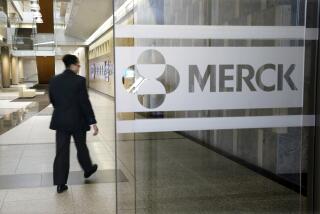Merck Soars on FDA’s OK of Asthma Drug
- Share via
Merck & Co. said it won U.S. Food and Drug Administration approval of its potential blockbuster asthma drug Singulair, sending the company’s shares up nearly 5%.
Merck shares rose $5.94 to close at $130.63 in active trading on the New York Stock Exchange on Monday.
Peak worldwide sales of Singulair could exceed $1 billion a year, putting pressure on competitors Zeneca and Abbott Laboratories, and asthma-inhaler makers such as Glaxo Wellcome, Schering-Plough Corp. and Minnesota Mining & Manufacturing Co., said Aros Securities analyst Tim O’Reilly.
The company is also studying the drug’s use as a treatment for allergies, which could boost sales even more, O’Reilly said.
Merck’s shares have risen from $117.69 on Feb. 13--an increase of more than 11%--in anticipation of the FDA approval, O’Reilly said.
Singulair is part of a new class of asthma drugs known as leukotriene receptor antagonists. They work by blocking substances in the body that act as co-conspirators in the inflammation suffered by asthma patients.
Unlike other drugs in the class--Zeneca’s Accolate and Abbott Labs’ Zyflo--Singulair needs to be taken only once a day. It is the first drug in the class to get approval for use by both adults and children as young as 6 years old.
In clinical studies, Merck found that patients taking Singulair every day suffered fewer asthma attacks and generally felt better.
Still, the drug is not intended as a treatment for an asthma attack. Patients should still use quick-relief medications for those, the company said.
Merck, based in Whitehouse Station, N.J., said it will sell Singulair for $1.86 a tablet. The price at the pharmacy will probably be between $69 and $72 a month, it said.
Asthma, a lung disorder that causes breathing difficulties, affects about 15 million Americans and causes nearly 5,000 deaths a year. The U.S. market for asthma drugs is expected to grow to as much as $2.38 billion in 2005 from $1.18 billion in 1996.
More to Read
Inside the business of entertainment
The Wide Shot brings you news, analysis and insights on everything from streaming wars to production — and what it all means for the future.
You may occasionally receive promotional content from the Los Angeles Times.










